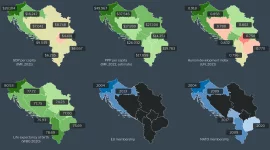Introduction
You may have had a moment when you heard a last name and pondered, “I wonder where that’s from?” Surnames, family names, or simply ‘last names,’ offer a fascinating glimpse into historical connections, cultural heritage, and migration patterns. In this post we are exploring the most common surnames in the US.
The United States, a melting pot of cultures and ethnicities, is rich in a mosaic of surnames that reflect the country’s vibrant immigration history. This post will explore the origins and meanings of the most common surnames among four major demographic groups: White, Black, Asian, and Hispanic Americans.
Origins of the surnames
Surnames, also referred to as family names or last names, provide a unique window into our past, history, culture, and lineage. Originating in different forms, surnames offer a rich understanding of the structure, tradition, and linguistics of societies that have come before us. They are remnants of the story of human civilization, passed down through generations.
Surname origins primarily fall into four categories:
- patronymics,
- locative,
- occupational, and
- nickname-based surnames.
Patronymics – A legacy of ancestors
Patronymic surnames are passed from one generation to the next and immortalized as a significant part of our identity. Derived from the given name of a person’s father or another ancestor, English-speaking societies provide abundant examples, such as “Johnson”, which signifies John’s son, and “Robertson”, meaning Robert’s son. However, this convention is not limited solely to English cultures.
Locative surnames – Bound to the land
Locative surnames serve as geographical signposts, tethering individuals to certain locations or geographical features. These surnames could reference towns, regions, or specific topographical elements. This form of surname was especially common when people were closely linked with their land or place of origin.
Names like “Brooklyn” or “Hill” in English, “Toledo” in Spanish, or “Da Vinci” (which means ‘of Vinci’) in Italian, indicate a family’s historical connection to a specific place. As people moved and migrated, these names remained as lasting links to their ancestral homes.
Occupational surnames – Reflecting livelihoods
Occupational surnames originate from the occupations, professions, or roles held by our ancestors. These names serve as a testament to societal structure, revealing the trades and crafts that were important during different periods of history.
Prevalent examples in English include “Smith” (referring to a blacksmith), “Baker”, “Fisher”, and “Carpenter”. Similarly, in German, a common surname is “Müller”, meaning ‘miller’. These names provide a glimpse into the professional landscape of past societies.
Nickname-based surnames – Echoes of personality
Lastly, nickname-based surnames bring a personal charm to our nomenclature. Evolved from nicknames, these surnames often reflect personal characteristics, habits, or even types of clothing one’s ancestors wore. They serve as enduring, albeit indirect, reminders of the individual quirks that make up a family’s history.
Names like “Armstrong” might indicate a particularly strong ancestor, “White” could be linked to someone with light hair or complexion, while “Goodfellow” might hint at a well-liked ancestor known for their good nature.
The true melting pot: White, Black, Asian, and Hispanic surnames
America mirrors a diverse and multicultural fabric woven from the threads of its immigrant history. This diversity and multicultural influence are readily apparent when examining the vast array of American surnames, a fascinating testament to the waves of immigration that have molded the nation’s demographic, cultural, and social landscape.
Surnames can sometimes give clues about a person’s ethnic background. However, it’s important to note that they cannot provide a definitive indication of someone’s race or ethnicity. Historically, surnames have often been linked to specific regions or countries, but numerous factors can complicate the relationship between a surname and racial or ethnic identity.
For example, the legacy of colonialism and slavery has resulted in people of various racial and ethnic backgrounds carrying traditionally European surnames. Similarly, immigration and intermarriage can lead to individuals of one racial or ethnic group carrying a surname more commonly found among another group. In the United States, where generations of immigration, intermarriage, and cultural assimilation have shaped the population, surnames often reflect a complex mosaic of cultural influences and personal histories.
Furthermore, people from the same racial or ethnic group can have diverse surnames due to regional differences, language variations, and historical shifts in naming practices. For instance, Asian-American surnames can originate from numerous countries and languages, each with its own unique naming customs.
European influence – The Old World’s imprint
The strong influence of European heritage is evident in many surnames common among white Americans. Predominantly, names such as “Smith”, “Johnson”, and “Williams” highlight the English origin, reflecting the early British colonization of North America. These names carry within them stories of the pioneers who first made the journey across the Atlantic, laying the foundations of the modern United States.
However, the European influence doesn’t end with the British Isles. The echoes of German, Irish, Italian, Croatian, and other European ancestries resonate widely in the American surname tapestry. Names like “Schneider”, “O’Brien”, and “Rossi” are not uncommon, signifying significant waves of immigration throughout the 19th and 20th centuries. These surnames symbolize the hopes and dreams of countless immigrants who sought new beginnings in the land of opportunity.
Top White surnames in the US
The five most common surnames among White Americans include:
| SURNAME / LAST NAME | TOTAL IN THE US | WHITE |
|---|---|---|
| Smith | 2,442,977 | 1,732,071 |
| Johnson | 1,932,812 | 1,139,779 |
| Miller | 1,161,437 | 976,885 |
| Brown | 1,437,026 | 832,757 |
| Jones | 1,425,470 | 786,717 |
These names, primarily of English origin, were often designated based on occupation, patronymics (derived from a father’s name), or even physical characteristics.
For example, “Smith,” traces back to the Old English term for a metal worker, or in a broader sense, an artisan. Names like “Johnson” (John’s son) or “Williams” (William’s son) are classic examples of patronymic names. “Brown” could have denoted someone with brown hair or clothing, while “Jones” is a patronymic name derived from “John.”
Interestingly, despite the ethnic diversity of the U.S., the prevalence of these English surnames points to the enduring impact of early English settlers. Additionally, the dominance of occupational and patronymic names reflects how medieval English societies identified individuals.
African-American surnames: Echoes of a troubled past
African-American, or Black, surnames embody a complex and often painful history, primarily influenced by the traumatic legacy of slavery and its aftermath. During the era of slavery, enslaved Africans were frequently given or adopted the surnames of their enslavers, a painful reminder of a brutal period in history.
Following emancipation, this pattern evolved. Some chose to retain these names, a decision that might have been influenced by a range of factors including familiarity or a desire to maintain a sense of community. Others embraced the freedom to adopt new surnames.
For example, “Washington”, a prominent surname among African-Americans, is thought to have been widely adopted during this period. “Johnson”, another frequently found African-American surname, originated as a patronymic name, highlighting the ongoing influence of these traditional naming practices.
It is noteworthy that many African Americans chose entirely new surnames after emancipation. “Washington” may have been selected by freed slaves to demonstrate their American identity.
Top Black surnames in the US
The five most common surnames among Black Americans include:
| SURNAME / LAST NAME | TOTAL IN THE US | BLACK |
|---|---|---|
| Williams | 1,625,252 | 774,920 |
| Johnson | 1,932,812 | 669,333 |
| Smith | 2,442,977 | 564,572 |
| Jones | 1,425,470 | 548,521 |
| Brown | 1,437,026 | 511,581 |
Asian-American surnames – A preservation of heritage
Asian-American surnames reflect the preservation of ancestral ties and heritage, often maintaining family names from the immigrants’ countries of origin. This pattern not only maps the chronology of different waves of immigration but also spotlights the cultural identities that individuals and families strived to maintain in their new homeland.
Common Korean surnames such as “Kim”, “Lee”, and “Park” are found alongside prevalent Chinese-American surnames like “Chen”, “Li”, and “Zhang”. Yet, one of the most common Asian-American surnames doesn’t come from either Korea or China, but from Vietnam.
“Nguyen”, a name carried by a substantial fraction of the Vietnamese population, is a prime example of a single surname’s substantial prevalence. This name is often linked to a dynasty that ruled Vietnam from the 16th to the 19th century, showcasing how history and politics can heavily influence naming patterns.
The varied spellings of these Asian-American names often mirror different romanization systems, further adding to the diversity of the American surname landscape. These surnames serve as poignant reminders of the rich and varied Asian cultures that have contributed to the American narrative.
Top Asian and Pacific Islander surnames in the US
The five most common surnames among Asian Americans include:
| SURNAME / LAST NAME | TOTAL IN THE US | ASIAN AND PACIFIC ISLANDER |
|---|---|---|
| Nguyen | 437,645 | 422,109 |
| Lee | 693,023 | 292,594 |
| Kim | 262,352 | 247,844 |
| Patel | 229,973 | 217,968 |
| Tran | 188,498 | 180,958 |
Hispanic surnames – A testament to Spanish and Latin American heritage
The sound of Hispanic surnames like “Garcia”, “Rodriguez”, and “Martinez” resonate with the rhythms of Spanish and Latin American heritage. These names, therefore, reflect a range of patronymic, locative, and occupational origins, speak to the vibrant Hispanic influence on American society.
Interestingly, many Hispanic individuals maintain the custom of using both their mother’s and father’s surnames in accordance with Spanish naming traditions. This practice signifies a deep respect for both maternal and paternal lineages, and it contributes to the rich diversity of Hispanic surnames in the United States.
Top Hispanic surnames in the US
The five most common surnames among Hispanic Americans include:
| SURNAME / LAST NAME | TOTAL IN THE US | HISPANIC |
|---|---|---|
| Garcia | 1,166,120 | 1,073,180 |
| Rodriguez | 1,094,924 | 1,026,710 |
| Hernandez | 1,043,281 | 989,969 |
| Martinez | 1,060,159 | 984,994 |
| Lopez | 874,523 | 812,607 |
The list of the top 200 US surnames
The following list shows the top 200 last names in the US based on the data from the Decennial Census survey, from the United States Census Bureau, and organized by the fine people at namecensus.com.
| RANK | SURNAME / LAST NAME | TOTAL IN THE US |
|---|---|---|
| 1 | Smith | 2,442,977 |
| 2 | Johnson | 1,932,812 |
| 3 | Williams | 1,625,252 |
| 4 | Brown | 1,437,026 |
| 5 | Jones | 1,425,470 |
| 6 | Garcia | 1,166,120 |
| 7 | Miller | 1,161,437 |
| 8 | Davis | 1,116,357 |
| 9 | Rodriguez | 1,094,924 |
| 10 | Martinez | 1,060,159 |
| 11 | Hernandez | 1,043,281 |
| 12 | Lopez | 874,523 |
| 13 | Gonzalez | 841,025 |
| 14 | Wilson | 801,882 |
| 15 | Anderson | 784,404 |
| 16 | Thomas | 756,142 |
| 17 | Taylor | 751,209 |
| 18 | Moore | 724,374 |
| 19 | Jackson | 708,099 |
| 20 | Martin | 702,625 |
| 21 | Lee | 693,023 |
| 22 | Perez | 681,645 |
| 23 | Thompson | 664,644 |
| 24 | White | 660,491 |
| 25 | Harris | 624,252 |
| 26 | Sanchez | 612,752 |
| 27 | Clark | 562,679 |
| 28 | Ramirez | 557,423 |
| 29 | Lewis | 531,781 |
| 30 | Robinson | 529,821 |
| 31 | Walker | 523,129 |
| 32 | Young | 484,447 |
| 33 | Allen | 482,607 |
| 34 | King | 465,422 |
| 35 | Wright | 458,980 |
| 36 | Scott | 439,530 |
| 37 | Torres | 437,813 |
| 38 | Nguyen | 437,645 |
| 39 | Hill | 434,827 |
| 40 | Flores | 433,969 |
| 41 | Green | 430,182 |
| 42 | Adams | 427,865 |
| 43 | Nelson | 424,958 |
| 44 | Baker | 419,586 |
| 45 | Hall | 407,076 |
| 46 | Rivera | 391,114 |
| 47 | Campbell | 386,157 |
| 48 | Mitchell | 384,486 |
| 49 | Carter | 376,966 |
| 50 | Roberts | 376,774 |
| 51 | Gomez | 365,655 |
| 52 | Phillips | 360,802 |
| 53 | Evans | 355,593 |
| 54 | Turner | 348,627 |
| 55 | Diaz | 347,636 |
| 56 | Parker | 336,221 |
| 57 | Cruz | 334,201 |
| 58 | Edwards | 332,423 |
| 59 | Collins | 329,770 |
| 60 | Reyes | 327,904 |
| 61 | Stewart | 324,957 |
| 62 | Morris | 318,884 |
| 63 | Morales | 311,777 |
| 64 | Murphy | 308,417 |
| 65 | Cook | 302,589 |
| 66 | Rogers | 302,261 |
| 67 | Gutierrez | 293,218 |
| 68 | Ortiz | 286,899 |
| 69 | Morgan | 286,280 |
| 70 | Cooper | 280,791 |
| 71 | Peterson | 278,297 |
| 72 | Bailey | 277,845 |
| 73 | Reed | 277,030 |
| 74 | Kelly | 267,394 |
| 75 | Howard | 264,826 |
| 76 | Ramos | 263,464 |
| 77 | Kim | 262,352 |
| 78 | Cox | 261,231 |
| 79 | Ward | 260,464 |
| 80 | Richardson | 259,798 |
| 81 | Watson | 252,579 |
| 82 | Brooks | 251,663 |
| 83 | Chavez | 250,898 |
| 84 | Wood | 250,715 |
| 85 | James | 249,379 |
| 86 | Bennett | 247,599 |
| 87 | Gray | 246,116 |
| 88 | Mendoza | 242,771 |
| 89 | Ruiz | 238,234 |
| 90 | Hughes | 236,271 |
| 91 | Price | 235,251 |
| 92 | Alvarez | 233,983 |
| 93 | Castillo | 230,420 |
| 94 | Sanders | 230,374 |
| 95 | Patel | 229,973 |
| 96 | Myers | 229,895 |
| 97 | Long | 229,374 |
| 98 | Ross | 229,368 |
| 99 | Foster | 227,764 |
| 100 | Jimenez | 227,118 |
| 101 | Powell | 224,874 |
| 102 | Jenkins | 222,653 |
| 103 | Perry | 221,741 |
| 104 | Russell | 221,558 |
| 105 | Sullivan | 220,990 |
| 106 | Bell | 220,599 |
| 107 | Coleman | 219,070 |
| 108 | Butler | 218,847 |
| 109 | Henderson | 218,393 |
| 110 | Barnes | 218,241 |
| 111 | Gonzales | 214,758 |
| 112 | Fisher | 214,703 |
| 113 | Vasquez | 212,781 |
| 114 | Simmons | 210,182 |
| 115 | Romero | 208,614 |
| 116 | Jordan | 208,403 |
| 117 | Patterson | 205,423 |
| 118 | Alexander | 204,621 |
| 119 | Hamilton | 201,746 |
| 120 | Graham | 201,159 |
| 121 | Reynolds | 200,247 |
| 122 | Griffin | 198,406 |
| 123 | Wallace | 197,276 |
| 124 | Moreno | 196,925 |
| 125 | West | 195,818 |
| 126 | Cole | 195,289 |
| 127 | Hayes | 194,246 |
| 128 | Bryant | 192,773 |
| 129 | Herrera | 192,711 |
| 130 | Gibson | 190,667 |
| 131 | Ellis | 188,968 |
| 132 | Tran | 188,498 |
| 133 | Medina | 188,497 |
| 134 | Aguilar | 186,512 |
| 135 | Stevens | 185,674 |
| 136 | Murray | 184,910 |
| 137 | Ford | 184,832 |
| 138 | Castro | 184,134 |
| 139 | Marshall | 183,922 |
| 140 | Owens | 182,719 |
| 141 | Harrison | 181,091 |
| 142 | Fernandez | 180,842 |
| 143 | McDonald | 180,497 |
| 144 | Woods | 177,425 |
| 145 | Washington | 177,386 |
| 146 | Kennedy | 176,865 |
| 147 | Wells | 176,230 |
| 148 | Vargas | 173,835 |
| 149 | Henry | 170,964 |
| 150 | Chen | 169,580 |
| 151 | Freeman | 169,149 |
| 152 | Webb | 168,878 |
| 153 | Tucker | 167,446 |
| 154 | Guzman | 167,044 |
| 155 | Burns | 165,925 |
| 156 | Crawford | 164,457 |
| 157 | Olson | 164,035 |
| 158 | Simpson | 163,181 |
| 159 | Porter | 163,054 |
| 160 | Hunter | 162,440 |
| 161 | Gordon | 161,833 |
| 162 | Mendez | 161,717 |
| 163 | Silva | 161,633 |
| 164 | Shaw | 160,400 |
| 165 | Snyder | 160,262 |
| 166 | Mason | 160,213 |
| 167 | Dixon | 159,480 |
| 168 | Munoz | 158,483 |
| 169 | Hunt | 158,421 |
| 170 | Hicks | 158,320 |
| 171 | Holmes | 156,780 |
| 172 | Palmer | 156,601 |
| 173 | Wagner | 155,795 |
| 174 | Black | 154,738 |
| 175 | Robertson | 153,666 |
| 176 | Boyd | 153,469 |
| 177 | Rose | 153,397 |
| 178 | Stone | 153,329 |
| 179 | Salazar | 152,703 |
| 180 | Fox | 152,334 |
| 181 | Warren | 152,147 |
| 182 | Mills | 151,942 |
| 183 | Meyer | 150,895 |
| 184 | Rice | 149,500 |
| 185 | Schmidt | 147,034 |
| 186 | Garza | 147,005 |
| 187 | Daniels | 146,570 |
| 188 | Ferguson | 146,426 |
| 189 | Nichols | 145,584 |
| 190 | Stephens | 144,646 |
| 191 | Soto | 144,451 |
| 192 | Weaver | 143,837 |
| 193 | Ryan | 143,452 |
| 194 | Gardner | 142,894 |
| 195 | Payne | 142,601 |
| 196 | Grant | 142,277 |
| 197 | Dunn | 141,427 |
| 198 | Kelley | 140,693 |
| 199 | Spencer | 139,951 |
| 200 | Hawkins | 139,751 |
Here’s how you can support us
We hope you like our content. You can support us in several ways. If you use ad-blocking software, please consider adding us to a safelist. When sharing our content, please link back to the source. Also, when sharing on Instagram, please tag @viborccom. The same is for Twitter (@viborccom).
Thanks! Hvala! Danke! Дякую!
ABOUT THE AUTHOR












